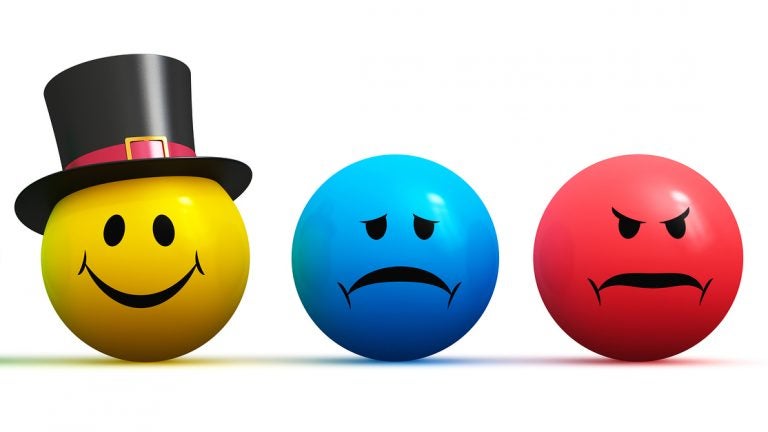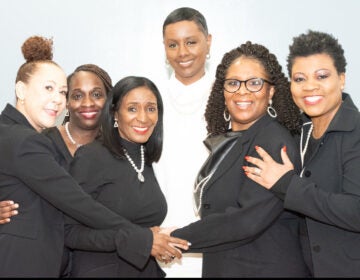Psychologist: Key to stopping anxiety is controlling your perception of events

Color smiley faces emoticons with four different moods: happiness sadness anger and displeasure isolated on white background
The key to ending anxiety and depression is controlling how we interpret our world said psychologist Debbie Joffe Ellis.
Joffe Ellis, who spoke at Rowan University on March 10, said these “unhealthy emotions” are the result not of events that we take part in, but the way we perceive those events. The wrong perception can lead us down the wrong path.
“Each one of us has control of our emotional destiny,” she said. “At the heart of hatred and terrorism is absolutist thinking.”
So how do we change our perceptions?
The first step is to accept that it is perception, not action, which is the key to controlling anxiety, depression, rage, and jealousy, which Joffe Ellis calls unhealthy emotions. This is because at the heart of these emotions is the belief that something “should” or “must” be a certain way. Holding this belief makes us more likely not to get what we want. “When we think this way, we set ourselves up for a fall,” she said. Instead, the key is replacing absolute beliefs with personal goals, to say that nothing must be a certain way, but that there is a way that we’d prefer it to be.
The same goes for things that we think are always or indisputably true. Overgeneralizing with words like “always” or “never” sets an unrealistic expectation of people or events. A healthy alternative, Joffe Ellis says, is the rational idea that something will “in all probability” be a certain way. If it fails to be this way however, it is far easier to understand and accept, because the expectation left room for this result.
So controlling our perceptions can actually make us happier, Joffe Ellis said. It helps us to realize that nothing is going to be perfect, that “stuff happens,” and it helps keep us going in the face of adverse situations.
This isn’t a radically new idea. In more than a few ways, Joffe Ellis’ ideas, which are rooted in a psychological and cognitive approach called Rational Emotive Behavior Therapy (REBT), are similar to those in ancient and eastern philosophical traditions. Only, Joffe Ellis doesn’t want to renounce emotion like the Greek Stoics, or say that all of life is suffering like in traditional Buddhism. The key here is the unconditional acceptance of yourself and of others.
“It doesn’t mean you don’t really care, it doesn’t mean that you lose a sense of morality and ethics,” she said. “But when you have unconditional acceptance for those who do evil things you are more likely to choose the actions that are productive than if you are coming from rage.”
Instead of abandoning emotions, Joffe Ellis says we just have to find healthy emotional responses instead. Concern, sadness, and regret are healthy alternatives to emotions that blind and cripple us like anxiety, depression, and rage.
What separates Joffe Ellis’ REBT into the realm of psychology instead of philosophy is the “homework” that comes with it, she said. In psychology, studies show that repetition of an exercise needs to occur over three or four weeks to change the way the brain actually functions. So Joffe Ellis promotes the “ABCs” of REBT.
The first step, she says, is to describe the event that has upset you and then to identify its consequence, whether it was emotional or physical. Our responses were likely rooted in those irrational beliefs, the ones predicated on “should” or “must.” So we must then dispute those beliefs by asking, “Will they help me?” “Are they logical?” and “Is there evidence to support them?” Replacing those absolutist ideas with new preferences then helps us to better accept the outcome and move forward, instead of dwelling on what cannot be changed.
Performing these kinds of checks and exercises for 30 days will begin to eliminate the unhealthy thoughts and emotions that have been holding you back. “The more you practice healthy thoughts in the good times, the easier it is to call on them in the bad times,” Joffe Ellis said.
Joffe Ellis is an adjunct professor at Columbia University of NYC and was awarded a gold medal by the Indian Board of Alternative Medicine in 1993. Her late husband, Dr. Albert Ellis, first conceptualized the psychotherapeutic approach of REBT as a ground breaking physiologist before his passing in 2007.
WHYY is your source for fact-based, in-depth journalism and information. As a nonprofit organization, we rely on financial support from readers like you. Please give today.




